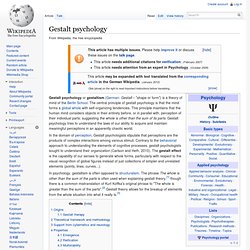

Gestalt psychology. Gestalt psychology or gestaltism (German: Gestalt – "shape or form") is a theory of mind of the Berlin School.

The central principle of gestalt psychology is that the mind forms a global whole with self-organizing tendencies. This principle maintains that the human mind considers objects in their entirety before, or in parallel with, perception of their individual parts; suggesting the whole is other than the sum of its parts. Gestalt psychology tries to understand the laws of our ability to acquire and maintain meaningful perceptions in an apparently chaotic world. In the domain of perception, Gestalt psychologists stipulate that perceptions are the products of complex interactions among various stimuli. Contrary to the behaviorist approach to understanding the elements of cognitive processes, gestalt psychologists sought to understand their organization (Carlson and Heth, 2010). Genetics accounts for more than half of variation in exam results.
Differences in children's exam results at secondary school owe more to genetics than teachers, schools or the family environment, according to a study published yesterday.

The research drew on the exam scores of more than 11,000 16-year-olds who sat GCSEs at the end of their secondary school education. In the compulsory core subjects of English, maths and science, genetics accounted for on average 58% of the differences in scores that children achieved. Grades in the sciences, such as physics, biology and chemistry, were more heritable than those in humanities subjects, such as art and music, at 58% and 42% respectively. The findings do not mean that children's performance at school is determined by their genes, or that schools and the child's environment have no influence. Human Sciences TOK - By Rutendo Munyati.